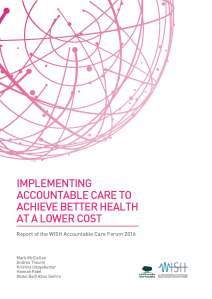 Most countries have well-established mechanisms to pay for medical treatments. However, many innovations – telemedicine, use of community health workers and lower-cost versions of treatments – are inadequately reimbursed, if reimbursed at all.
Most countries have well-established mechanisms to pay for medical treatments. However, many innovations – telemedicine, use of community health workers and lower-cost versions of treatments – are inadequately reimbursed, if reimbursed at all.
Payment systems are often slow to support new care models, and understandably so: additional payments for innovations create fiscal concerns; innovations may not be cost-effective unless integrated appropriately with other services; and existing institutions may lack experience or clear authority to support new services. Accountable care can help to overcome such barriers.
Accountable care seeks to align health financing and regulatory systems with person centred care reforms and enable changing population health needs and opportunities to be addressed at a lower cost. We define accountable care as a group of providers who are held jointly accountable for achieving a set of outcomes for a defined population over a period of time and for an agreed cost. Evidence suggests that adopting accountable care through incremental policy changes or comprehensive payment reforms can reduce hospital readmissions, emergency department use and overall spending. Accountable care can also increase patient satisfaction, improve chronic disease management and prevent costly complications.
However, to implement accountable care requires new organisational capabilities and professional expectations. Effective implementation is not only technical. It will involve putting into practice new performance measures and financing models, but also steps to support healthcare organisations in managing change.
The new report ‘Implementing accountable care to achieve better health at a lower cost’ is up for discussion at today’s World Innovation Summit for Health (WISH) in Doha, Qatar.
The report defines accountable care as a group of providers who are held jointly accountable for achieving a set of outcomes for a defined population over a period of time and for an agreed cost. The authors draw on diverse case studies to illustrate how accountable care can be achieved through three different approaches:
- Innovating primary-care-focused reforms to build efficient access to low-cost preventive and primary care services, and better co-ordination with advanced and specialized care.
- Problem-focused care reforms to support broader access to more efficient, high-quality services providing ‘episodes’ of care for specific conditions.
- Comprehensive care reforms to incorporate accountability for the full spectrum of care for a population.
- The case studies, all at varying levels of maturity, share several common features that demonstrate how accountable care goals can be achieved on a practical level.
Report insights
The evidence suggests that adopting accountable care through incremental policy changes or comprehensive payment reforms can have a substantial impact: reducing hospital readmissions, emergency department use and overall spending. Evidence outlined in the report also suggests that the successful implementation of accountable care requires policymakers to respond to local priorities, create momentum and convey the practical relevance of reform to stakeholders.
Policymakers must also take into account the largest gaps in health and efficiency of care and the capabilities of local healthcare organisations.
An incremental model may be most appropriate for countries tackling long-term and costly conditions, such as diabetes. In other cases, countries may implement a model with full accountability for population health results. In all cases, simply changing payment mechanisms is not enough to achieve the implementation of much needed innovation.
Further Reading
Read the full report here.
Read all the WISH forum reports here.
About the World Innovation Summit for Health (WISH)
WISH focuses on some of the most pressing global health challenges facing governments, health systems and populations. WISH brings together internationally renowned experts, who work with advisory groups to publish evidence-based reports on a range of healthcare topics each year.
Chaired by a team of experts drawn from academia, industry and policymaking, the WISH Forums look in depth at the challenges faced in each area – surveying the literature and interviewing experts in the field. The Forum reports present some of the very best innovations that have been shown to have real impact across the developed and the developing world.
During the Summit, the Forum reports will form the basis of a series of panel discussions hosted by leading experts. The Chair of each Forum will open the panel discussion, focusing on ways key issues can be tackled and considering some of the available innovations that might help.
For further information about WISH and previous conferences, visit their website.
